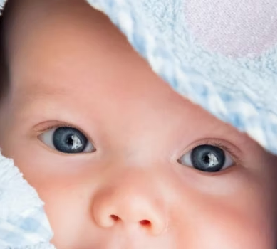Did you know that right after a baby is born, an application of a particular ophthalmic ointment is made to their eyes? Do you realize why? In some situations, an eye ointment may be necessary for the health of your newborn.
Does your newborn really need eye ointment?
Eye ointments can be used to deter and cure different eye infections. Antibiotic eye ointments are applied most frequently for the purpose of preventing ophthalmia neonatorum, which is an infection of the eye that can damage newborns' eyes. Ophthalmia neonatorum is a condition that affects newborns whose mothers were infected with chlamydia during pregnancy. Neisseria gonorrhoeae, the bacteria responsible for gonorrhea, can infect the baby's eyes as they can travel through the birth canal.
If a woman does not undergo screening for sexually transmitted diseases (STIs), she may be unaware that she has acquired gonorrhea. Babies with this condition may not display any signs when they are born. After delivery, symptoms may start to appear up to 5 days later. Their eyes will turn red, swollen, and pus-filled. Ophthalmia neonatorum is a condition that needs to be treated with intravenous antibiotics and necessitates a prolonged hospital stay. If left untreated, it can cause irreversible eye damage or even blindness.

For the prevention of this disease, an ophthalmic ointment is administered to the eyes of every baby. A small amount of ointment will be applied under the lower eyelids of your infant by a medical professional. The ointment will make their vision hazy for a few moments, but it will not irritate or harm them. It is advised by the majority of medical professionals that eye ointment must be applied to all newborns for the safe side.
What is the function of eye ointment for infants?
There are other types of bacteria besides gonorrhea that can lead to eye infections in young children and babies. Most microorganisms only cause mild infections, but gonorrhea can cause serious problems like neonatal conjunctivitis. Infants born to moms infected with gonorrhea have a 30-50% chance of developing ophthalmia neonatorum if precautions are not followed.
Additionally, it's crucial to remember that anyone can have an eye infection. It's not just a problem for newborns. Children of all ages, including toddlers, are susceptible to eye infections. Viruses or allergies are the most common causes of conjunctivitis in children, although bacterial infection can also be a cause. Eyelid swelling, red eyes, and a yellow discharge are classic symptoms of bacterial conjunctivitis, which your child may develop if he has recently been exposed to an infected person.
Does a newborn need eye ointment in any case?
Your infant does not need the ointment unless the mother has been found to have a sexually transmitted infection (STI). Don't be angry if your nurse applies antibiotic eye ointment to your baby's eyes to prevent gonorrhea issues. For many years, this procedure has been used. Despite being infected with gonorrhea, many women never exhibit symptoms, and a newborn's eyes may initially appear healthy but subsequently develop neonatal conjunctivitis.
In addition, a wide variety of other species, including bacteria that typically inhabit your rectum and vagina, can result in neonatal conjunctivitis. Preventative interventions are preferable than later-onset and life-threatening infections.
What are the adverse effects of ophthalmic ointment in newborns?
The following are typical adverse reactions to antibiotic ointment:
- Slightly irritated eyes
- Stinging
- Burning
- Erythema
- Momentary haziness
- Sensitivity







0 Comments
For comments please reply here.......